If you’re the proud owner of a Labrador, there’s no doubt that you’re constantly searching for wholesome and yummy treats to spoil your pet. And feeding fruits to your dog is the best way to accomplish that. But not every fruit is suitable for Labradors to eat. So, can Labradors eat fruit? If so, which ones?
In general, strawberries, bananas, raspberries, watermelon, apples, blackberries, mango, and pears are favorites of Labradors. Oranges, peaches, and plums are the less significant but still healthy fruit options for your Labrador.
Due to their high vitamin content, several knowledgeable canine nutritionists advise including some fruits in your dog’s diet.
I’ve carefully chosen for you the top 25+ safe fruits in this article that you can feed your Labrador. Let’s find out which fruits are best for your dog now.

Can Labradors Eat Fruit?
A great way to zest up your Labrador’s meals is to give them some snackable additions to their diet. However, you should always prioritize a healthy, balanced diet.
If you do decide to give your Labrador treats, it is best to go with simple, whole foods whose precise ingredients you are aware of. Fruits are a great option for most dogs because they not only offer a tasty treat but also some healthy variety in your dog’s diet.
Unlike many processed treats, fruits come with countless benefits. They’re packed with antioxidant compounds such as Vitamins A and C, carotenoids, and flavonoids, all of which have been linked to improved health and longer life. Scientists have also suggested that an antioxidant-rich diet can improve cognitive function in our canine friends.
Below is a list of perfectly safe fruits for your Labrador to eat. I’ll also tell you…
- How to prepare fruit for your Labrador
- Serving sizes and advice
- Which fruits are dangerous for your Labrador
Let’s get started!
Apples
Labradors can eat apples. They have many health benefits and are a rich source of fiber, calcium, phosphorus, vitamins A and C, and antioxidants that can help boost your dog’s immune system and maintain strong bones and tissues. Additionally, the dietary fiber in apples promotes a healthy digestive system.
The sweet flavor and crisp texture of apples will appeal to your Labrador’s taste buds and help maintain clean teeth and fresh breath.
Here are some of the most important nutrients you can find in apples to benefit your Labrador:
- Fiber
- Vitamin C
- Vitamin A
- Vitamin K
- Potassium
- Calcium
- Phosphorus
- Antioxidants
How to feed a Labrador apple:
To feed a Labrador apple, start by washing the apple thoroughly to remove any pesticides or dirt. Then, remove the core and seeds and cut the apple into small, bite-sized pieces. You can give the apple pieces to your Labrador as a treat or mix them into their regular food.
I often mix in some diced apples with my dog’s regular food. Apples are a great source of fiber and help regulate her digestive system.
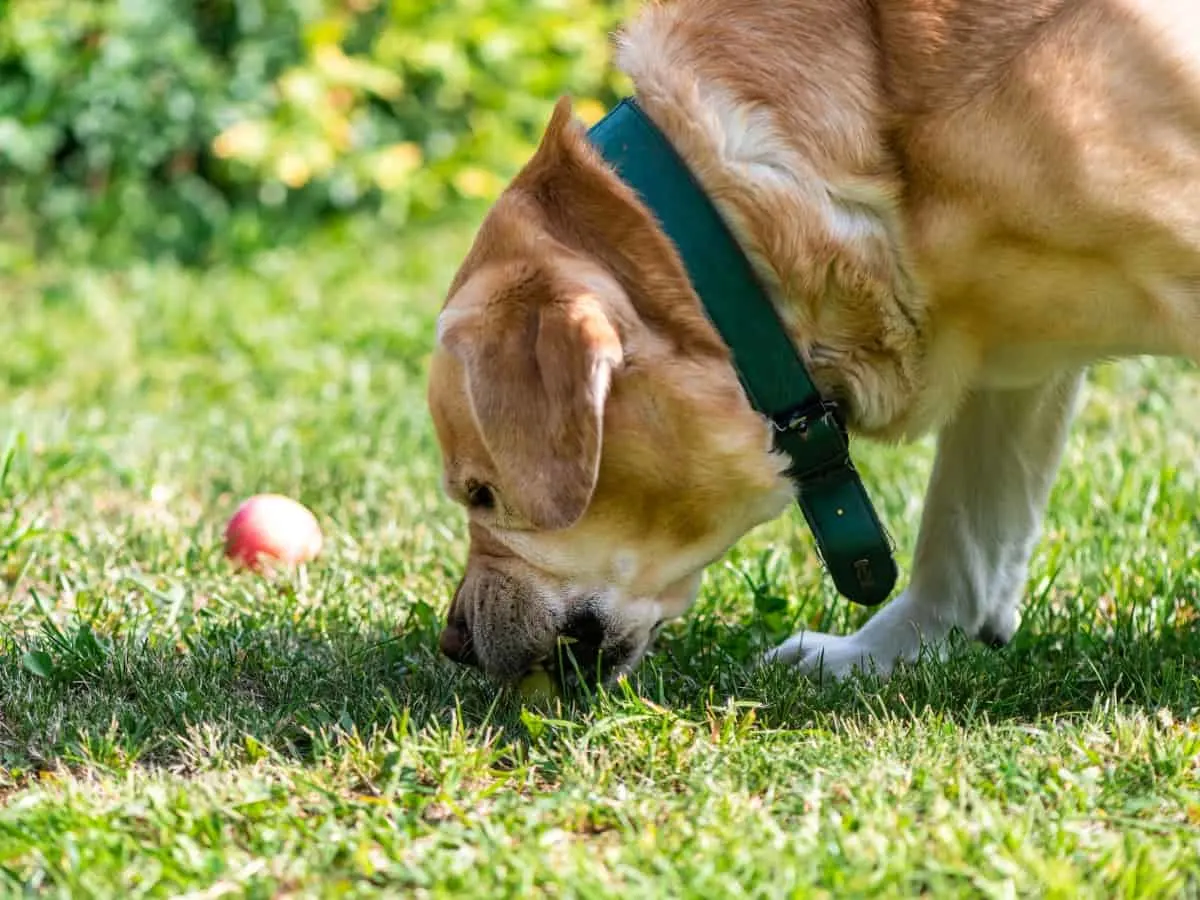
Apricots
Labradors can eat apricots. They are rich in vitamins A and C, which are excellent for maintaining healthy skin, eyesight, and immune system function. They also contain dietary fiber, which can support digestive health and regulate blood sugar levels, and potassium to promote heart health and regulate fluid balance.
The sweet and juicy flavor of apricots may be appealing to some Labradors, but it ultimately depends on their individual taste preferences.
Here are some of the most important nutrients you can find in apricots to benefit your Labrador:
- Vitamin A
- Vitamin C
- Vitamin E
- Beta-carotene
- Potassium
- Iron
- Zinc
- Dietary fiber
How to feed a Labrador apricot:
To feed a Labrador apricot, wash the fruit thoroughly, remove the pit, and cut it into small pieces. Offer the apricot pieces as a treat, or mix them into your dog’s food. Keep in mind that apricots are high in sugar, so it’s important to limit the amount you give to your Labrador.

Bananas
Labradors can eat bananas. They are rich in potassium, which can help control blood pressure, support muscle and nerve function, and maintain a healthy heart. They also include vitamin C, which can boost the immune system and promote healthy skin and coat, and are a good source of dietary fiber, which aids digestion and supports a healthy gut.
Your Labrador may like bananas because they are sweet and have a pleasant texture. Furthermore, they contain natural sugars that can give a quick burst of energy, which may be appealing to your dog.
Here are some of the most important nutrients you can find in bananas to benefit your Labrador:
- Potassium
- Vitamin C
- Dietary fiber
- Vitamin B6
- Magnesium
- Copper
- Manganese
How to feed a Labrador banana:
A safe way to feed a Labrador banana is to remove the skin, slice a small piece into bite-sized pieces, or mash it up and mix it into your dog’s food. Bananas are high in sugar, so they should only be given to your Labrador in moderation.
My dog loves snacking on bananas, and I love giving them to her because they are rich in potassium and help support her heart health.
Blackberries
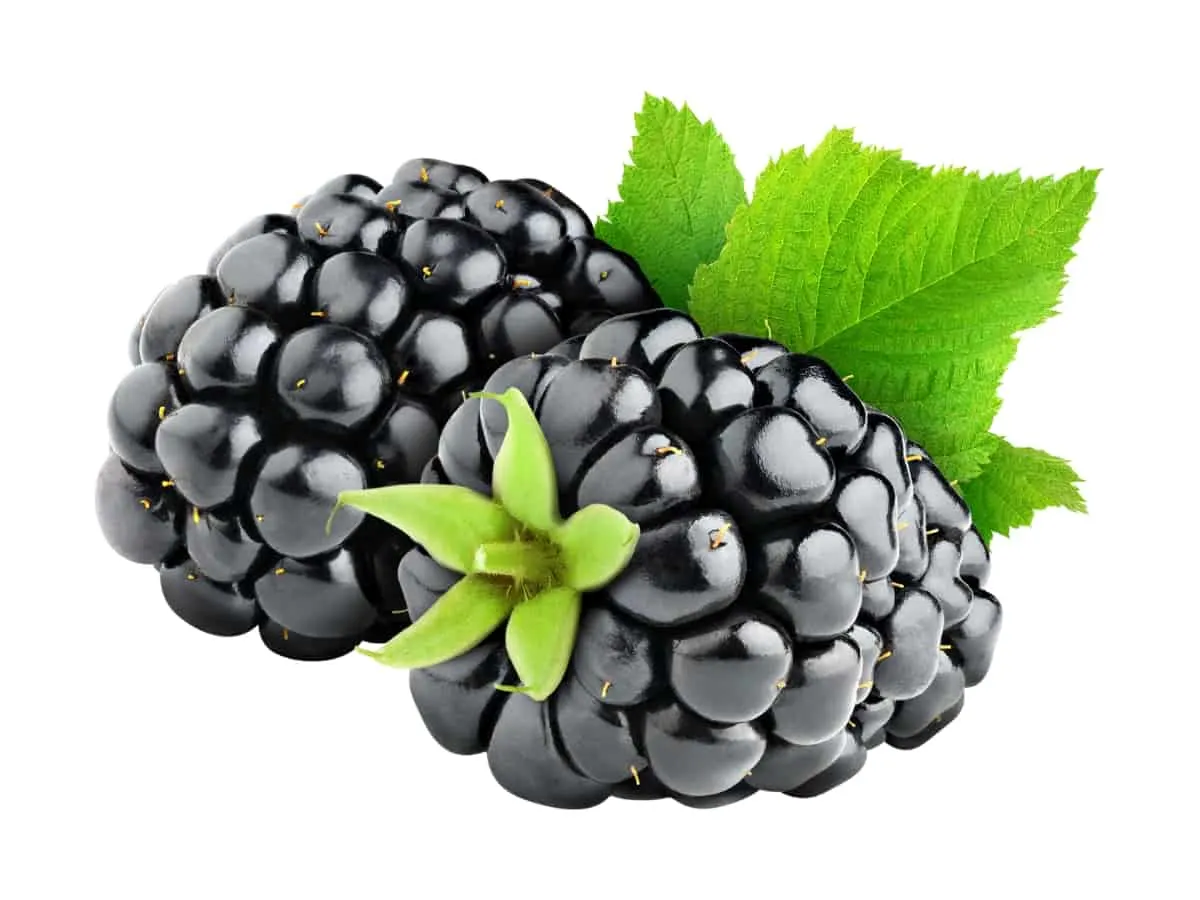
Labradors can eat blackberries in moderation, and they can offer some nutritional advantages. They are high in vitamins C and K, along with dietary fiber, which can support a healthy immune system and digestion. They also contain antioxidants, which can help defend cells from damage caused by free radicals.
Some Labradors may like blackberries due to their sweetness and pleasant texture, while others may not be interested in them. You will need to experiment with your Labrador to find out!
Here are some of the most important nutrients you can find in blackberries to benefit your Labrador:
- Vitamin C
- Fiber
- Manganese
- Vitamin K
- Potassium
- Calcium
- Vitamin E
How to feed a Labrador blackberries:
Wash the blackberries thoroughly and feed them sparingly due to their high sugar content. Avoid feeding blackberries that are canned, frozen, or contain added sugars, as these can be harmful to your dog’s health.
Blueberries
Labradors can eat blueberries. They are low in calories and high in fiber, antioxidants, and vitamins such as vitamin C and vitamin K. These nutrients can help support your Labrador’s immune system, promote healthy digestion, improve heart health, and reduce inflammation.
Blueberries also contain flavonoids, which have been proven to improve cognitive function and memory in canines. Additionally, the antioxidants in blueberries can help protect your Labrador’s eyes and reduce the risk of certain types of cancer.
Your Labrador may enjoy blueberries as they are naturally sweet, and many dogs have a sweet tooth just like humans! They may also be attracted to the smell and texture of this fruit.
Here are some of the most important nutrients you can find in blueberries to benefit your Labrador:
- Vitamin C
- Fiber
- Vitamin K
- Potassium
- Calcium
- Magnesium
- Zinc
- Antioxidants
How to feed a Labrador blueberries:
Blueberries are safe for Labradors whether they are fresh, frozen, dried, or mashed. However, you should introduce them slowly if your Labrador has never eaten them before. It is also important to avoid canned or processed blueberries as they may contain harmful additives such as sugar, syrup, sweeteners, and preservatives.
I love adding blueberries to my dog’s diet because they are packed with antioxidants and help improve her immune system.
Cantaloupe Melon

Labradors can eat cantaloupe melon. Cantaloupe is a healthy and wholesome fruit with a great source of vitamins A, B6, and C and dietary fiber, which are vital for maintaining a healthy and active lifestyle. Cantaloupe is a healthy, hydrating snack and is also low in fat and calories.
The soft, juicy texture and sweet taste will appeal to your Labrador. Cantaloupe is also a good source of hydration for dogs due to its high water content.
Here are some of the most important nutrients you can find in cantaloupe to benefit your Labrador:
- Vitamin C
- Vitamin A
- Potassium
- Fiber
- Beta-carotene
- Folate
- Water
How to feed a Labrador cantaloupe:
If you’re wondering how to feed your Labrador Cantaloupe, you must remove all seeds and the rind before feeding, as they can be a choking hazard or cause an intestinal blockage.
Clementines
Labradors can eat clementines. However, while they are not poisonous to Labradors, they are not advised due to their high sugar and acidic content, which can cause digestive problems such as upset stomach, vomiting, and diarrhea.
Although clementines are a good source of vitamin C, which promotes a healthy immune system, I’ve listed other fruits that are safer and more worthwhile for your Labrador to eat.
If you do want to feed your Labrador clementines, it’s important to remove all seeds and the peel before feeding any to your dog. You should feed extremely sparingly and monitor your Labrador for any signs of digestive issues.
Coconut
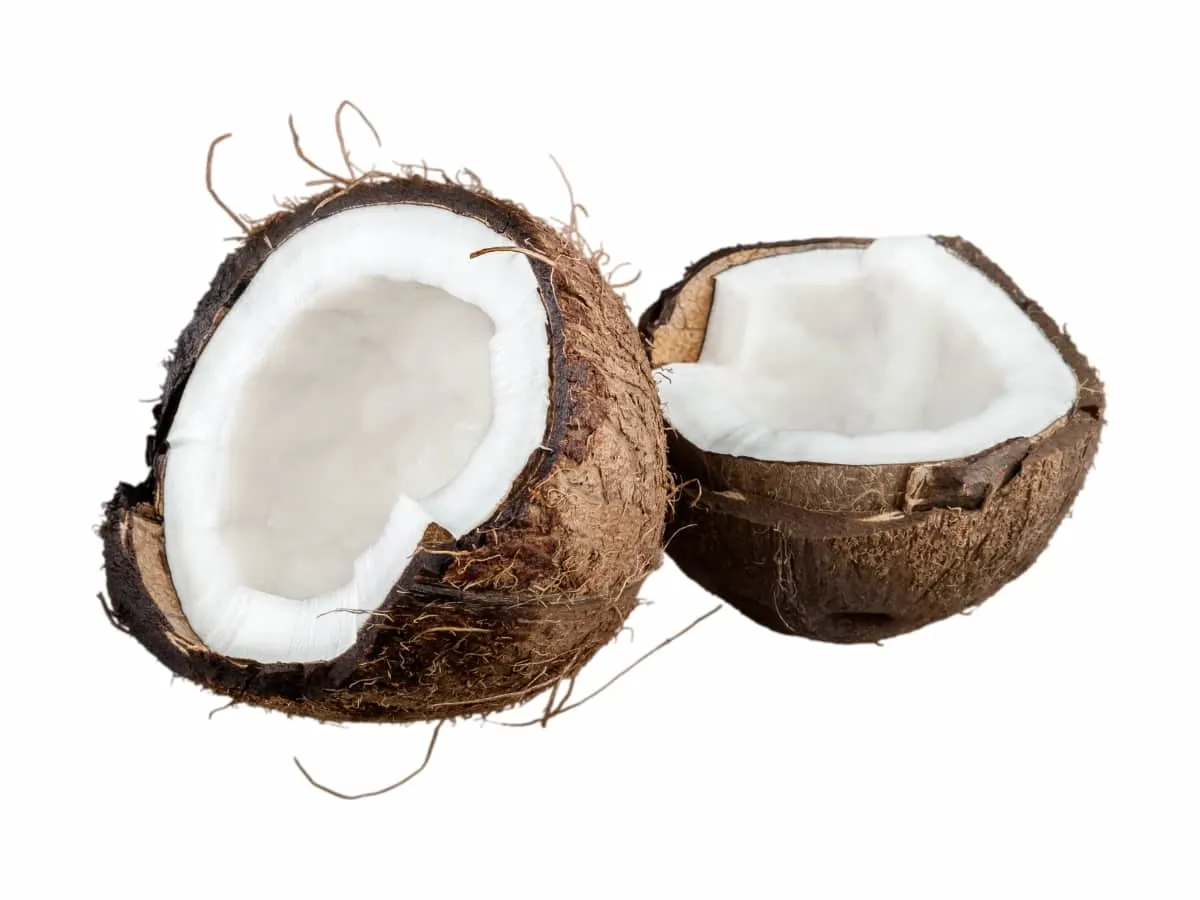
Labradors can eat coconut. It is a great source of dietary fiber, which helps promote digestive health and includes healthy fats that can help support healthy skin and coat. Coconut is also high in lauric acid, which has antibacterial and antiviral properties that can help boost the immune system.
Your Labrador may like coconut because of its texture and flavor. It has a unique texture that can be attractive to some dogs, and its mild, nutty flavor can be attractive to their taste buds.
Here are some of the most important nutrients you can find in coconut to benefit your Labrador:
- Dietary fiber
- Healthy fats
- Lauric acid
- Iron
- Potassium
- Zinc
- Magnesium
How to feed a Labrador coconut:
As coconut is high in fat and calories, you should only feed it to your Labrador in moderation. You must remove the shell and any other hard parts of the coconut before cutting it into tiny pieces that are easy for your dog to chew and swallow.
Cucumbers
Labradors can eat cucumbers. They are a great source of vitamins C and K, as well as dietary fiber, which helps promote digestive health. Cucumbers are also low in fat and calories, making them an excellent snack option for overweight dogs. Additionally, they contain a lot of water, which can help keep your dog hydrated.
As cucumbers are refreshing with a mild taste, most Labradors will enjoy their taste and crunch. But you’ll need to test to see if this is the case for your dog.
Here are some of the most important nutrients you can find in cucumber to benefit your Labrador:
- Vitamin C
- Vitamin K
- Potassium
- Magnesium
- Dietary fiber
- Manganese
- Vitamin B6
How to feed a Labrador cucumber:
When preparing cucumber for your Labrador, cut it into small pieces that are easy for your dog to chew and swallow, and remove the seeds and skin, as they can be difficult for dogs to digest.

Dates
Labradors can eat dates in moderation. They are a great source of fiber, potassium, and several vitamins and minerals, including vitamin B6 and iron. They also contain antioxidants, which can help protect cells from damage and support general health.
However, dates are full of natural sugars, which can cause weight gain and other health problems if consumed in excess.
The sweet taste of dates may be appealing to some Labradors, while others may not be as keen.
Here are some of the most important nutrients you can find in dates to benefit your Labrador:
- Fiber
- Potassium
- Magnesium
- Vitamin B6
- Iron
- Calcium
- Vitamin A
How to feed a Labrador dates:
To feed your Labrador dates, it’s essential to remove the pit and cut the fruit into small pieces that are easy for your Labrador to chew and swallow. Start by giving your dog a small piece and monitoring their reaction to ensure they can tolerate it.
Honeydew Melon

Labradors can eat honeydew melon. Honeydew is high in vitamins and minerals such as Vitamin C, potassium, and fiber. Moreover, it is also a good source of antioxidants, which help to boost the immune system and protect against diseases, and is low in calories.
Honeydew melons are high in water content and are perfect for quenching your Labrador’s thirst in hot weather. Your Labrador may like melon because it is soft, sweet, and simple to chew.
Here are some of the most important nutrients you can find in honeydew to benefit your Labrador:
- Fiber
- Vitamin C
- Potassium
- Carotenoids (beta-carotene and phytoene)
- Antioxidants
- Folate
- Vitamin B6
How to feed a Labrador honeydew melon:
One of the best ways to feed honeydew to a Labrador is to offer them a few small pieces that have been scooped out with a melon baller. This helps to avoid the rind and seeds, which can be difficult for your Labrador’s digestive system to process.
Kiwi
Labradors can eat kiwi. It is high in Vitamin C and fiber, which can help to support your Labrador’s digestive and immune systems. Additionally, kiwi contains antioxidants that can help to protect against disease and promote overall health, and potassium, which is important for the heart.
The sweet and tangy flavor may be attractive to your Labrador. It is a soft fruit that is easy to chew and swallow, making it a good choice for dogs with dental issues or those who have trouble eating harder foods.
Here are some of the most important nutrients you can find in kiwi to benefit your Labrador:
- Vitamin C
- Fiber
- Potassium
- Antioxidants
- Folate
- Vitamin K
- Vitamin E
How to feed a Labrador kiwi:
To feed your Labrador kiwi fruit, you should wash and peel the fruit first. Then, cut the kiwi into small pieces and remove any seeds. Feed sparingly and monitor your Labrador for signs of digestive upset.
Mandarins
Labradors can eat mandarins – with a caveat. They are highly acidic and sugary and can easily cause your dog an upset stomach, diarrhea, and vomiting. If you do choose to feed your Labrador mandarin, they are an excellent source of vitamin C, which promotes a healthy immune system, and fiber, which helps with digestive health.
The sweet and tangy taste of mandarins can be appealing to some Labradors, but not all have the same preferences when it comes to food.
It’s best to introduce mandarins to your dog in small doses and watch how they react to ensure they can tolerate them without experiencing any negative effects. Before feeding, you should remove the peel and seeds.
Mangoes

Labradors can eat mangoes. They are a perfect source of vitamin C, which is essential for immune function and skin health, as well as vitamin A, which is good for eye health. Mangoes are also high in antioxidants, which can help safeguard against cellular damage and reduce the risk of chronic diseases such as cancer and heart disease.
Mangoes’ fiber content can also support digestive health. However, they are high in sugar, so they should only be given to your Labrador in moderation.
Many dogs are attracted to the fruit’s sweet taste and aroma, whereas others won’t be interested in them. Here are some of the most important nutrients you can find in mangoes to benefit your Labrador:
- Vitamin C
- Vitamin A
- Fiber
- Polyphenols
- Carotenoids
- Folate
- Potassium
How to feed a Labrador mangoes:
Before feeding mango to your Labrador, wash the fruit thoroughly, peel it, and remove the pit to prevent choking. You can then cut the mango into small pieces and serve. I like to add some diced mango to my dog’s meals. Mangoes are high in antioxidants and help support her immune system.
Nectarines
Labradors can eat nectarines. They include vitamins A and C, which can help strengthen the immune system, improve vision, and promote healthy skin and coat. Furthermore, nectarines contain antioxidants, which may have health benefits for diabetes, some cancers, and brain health. They also contain dietary fiber, which can aid in digestion and promote bowel regularity.
The sweet and juicy flavor of nectarines may appeal to your Labrador, but it ultimately depends on their individual taste preferences.
Here are some of the most important nutrients you can find in nectarines to benefit your Labrador:
- Vitamin A
- Vitamin C
- Potassium
- Fiber
- Niacin (B3)
- Pantothenic acid (B5)
- Vitamin B6
How to feed a Labrador nectarines:
The best way to feed a Labrador nectarine is to remove the pit and cut the fruit into small, bite-sized pieces. You should introduce nectarines to your dog’s diet slowly and in small amounts to avoid a stomach upset.
Olives

Labradors can eat olives, but there’s a warning. Although not toxic, they are high in fat and sodium, so they should only be given to dogs sparingly. On the other hand, olives are a good source of iron and fiber and are full of nutrients like vitamin E, which is an antioxidant that helps safeguard cells from damage caused by free radicals.
Olives are also a great source of healthy monounsaturated fats, which can help reduce the risk of heart disease by lowering LDL (bad) cholesterol levels. Additionally, the polyphenols in olives have anti-inflammatory properties that may help reduce the risk of chronic diseases such as cancer and Alzheimer’s.
Some Labradors may not like the taste and texture of olives, so you’ll need to test the water and see how your furry friend’s tastebuds react!
Here are some of the most important nutrients you can find in olives to benefit your Labrador:
- Monounsaturated fats
- Polyphenols
- Vitamin E
- Fiber
- Iron
- Copper
- Antioxidants
How to feed a Labrador olives:
To feed olives to your Labrador, you should first remove the pit to prevent choking. You can then give your dog a few pieces of olive as a treat or mix them into their food. It’s important to monitor your dog for any signs of digestive upset after introducing olives to its diet.
Oranges
Labradors can technically eat oranges (and other citrus fruits) as they are not toxic to dogs. However, oranges are full of sugar and will likely cause significant diarrhea if your Labrador eats them. Oranges also contain citric acid, which can be harmful to some dogs, especially those with sensitive stomachs or other health problems.
If you want to feed your Labrador oranges, the benefits are that they are high in vitamin C, which is important for immune system function, as well as potassium, which helps regulate blood pressure and supports the heart. Oranges also contain dietary fiber, which encourages good digestive health.
Here’s what you should do when feeding your Labrador oranges:
- Remove the peel
- Remove the seeds
- Cut into tiny pieces
- Introduce gradually
- Feed in moderation
Whenever my dog needs a pick-me-up, I give her a slice of orange. Oranges are full of vitamin C and help improve her energy levels.
Papaya
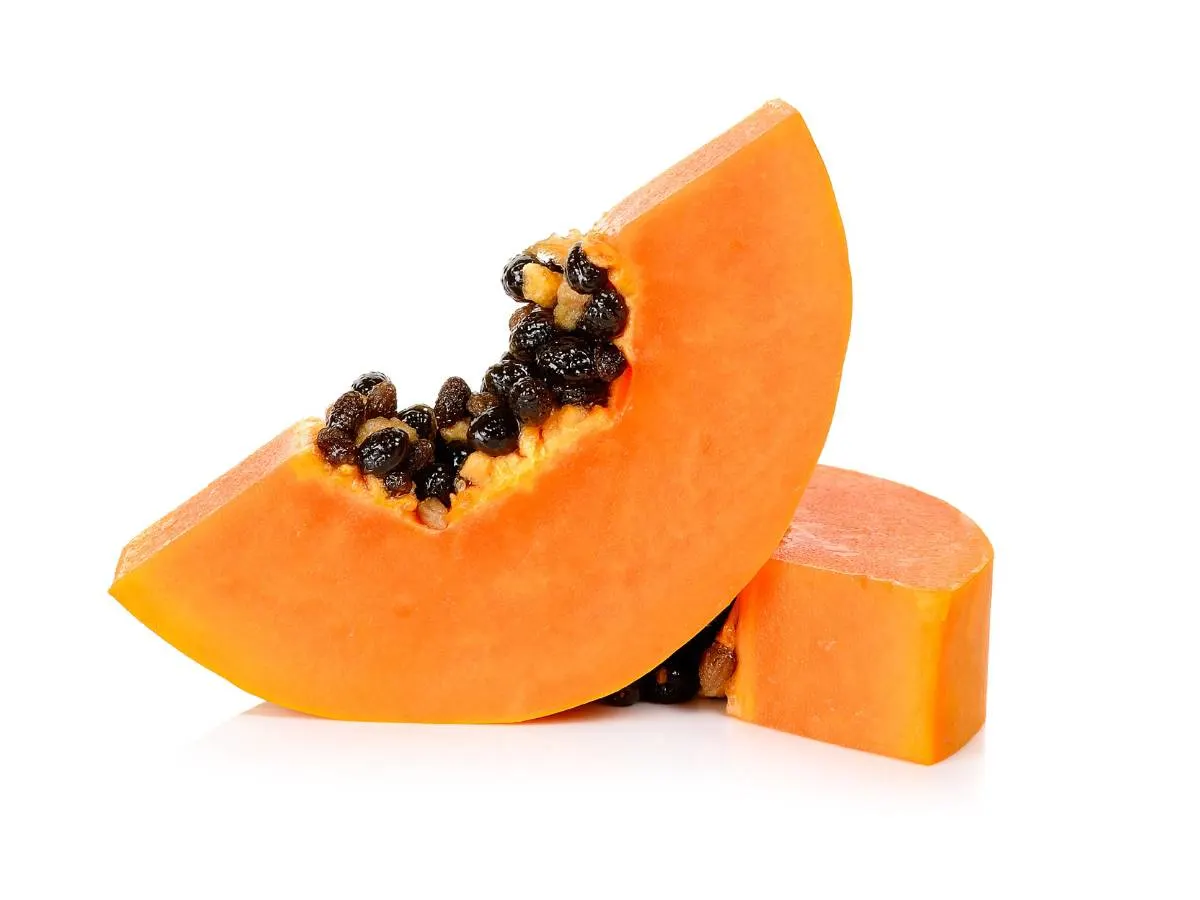
Labradors can eat papaya. It is a great source of vitamins A, C, and E, which can boost the immune system, promote healthy skin and coat, and improve vision. Papaya also includes digestive enzymes, such as papain, which can aid in digestion and encourage bowel regularity. Furthermore, papaya is low in calories and high in fiber.
Most Labradors seem to enjoy the flavor of papaya, which may be due to its natural sweetness.
Here are some of the most important nutrients you can find in papaya to benefit your Labrador:
- Calcium
- Magnesium
- Potassium
- Phosphorus
- Vitamin C
- Vitamin A
- Vitamin E
- Fiber
How to feed a Labrador papaya:
When feeding papaya to your Labrador, remove the seeds and rind from the papaya fruit. You can then cut the ripe flesh of the fruit into small pieces and give it to your dog.
Peaches
Labradors can eat peaches. They are a great source of vitamins A and C, fiber, and potassium, which can promote digestion, enhance the immune system, support eye health, and promote healthy skin. Peaches also contain antioxidants and anti-inflammatories that can help protect against chronic diseases.
Labradors may be attached to peaches due to their aroma, texture, and sweet and juicy flavor. You’ll need to experiment with your Labrador to see if they take to this fruit.
Here are some of the most important nutrients you can find in peaches to benefit your Labrador:
- Vitamin A
- Vitamin C
- Potassium
- Fiber
- Beta-carotene
- Niacin
- Magnesium
How to feed a Labrador peaches:
Peaches can be fed to your Labrador after being thoroughly washed to remove any dirt or pesticides. The peach should then be pitted and cut into bite-sized pieces. The pit must be removed because it can be a choking hazard and contains trace amounts of cyanide, which can be toxic to dogs in large doses.
Pears
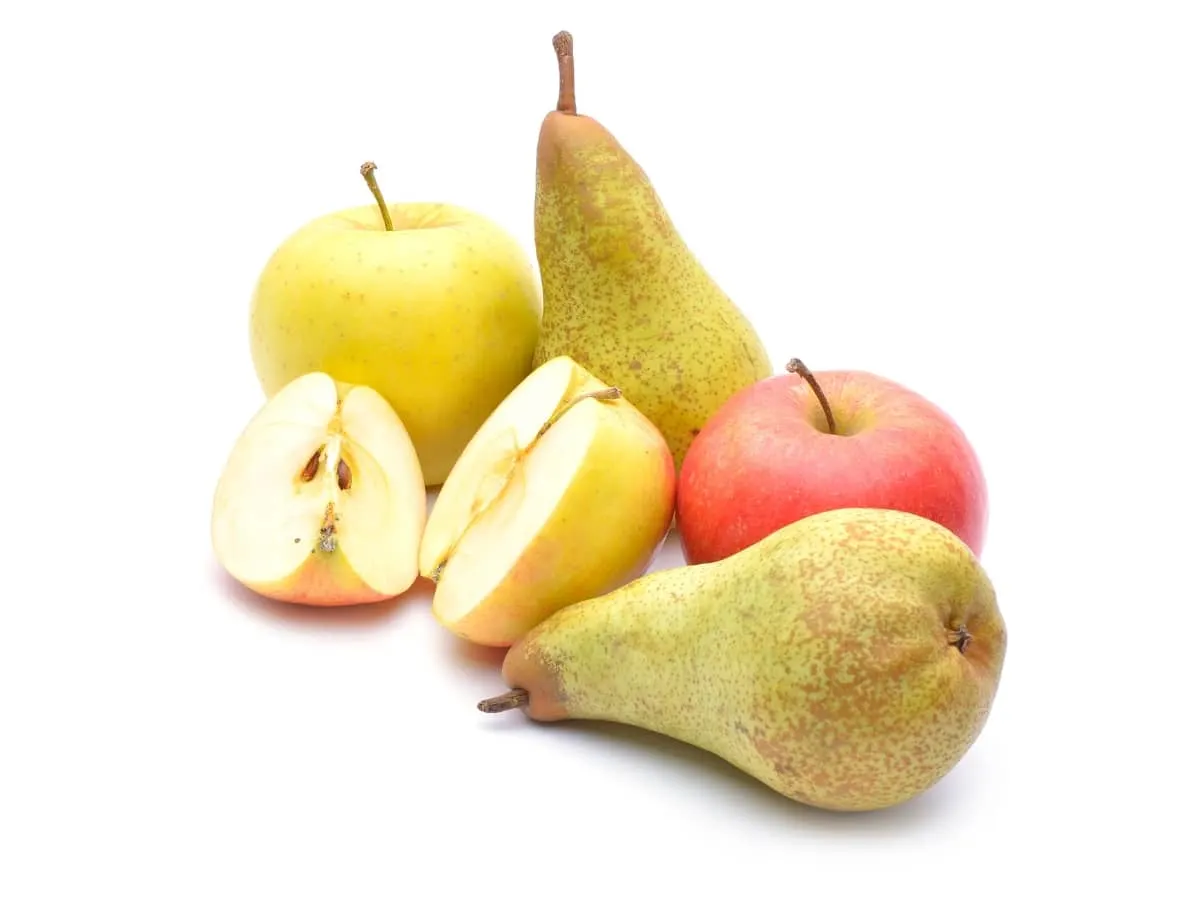
Labradors can eat pears. They are an excellent source of vitamins C and K, fiber, and copper, which can promote healthy digestion, support the immune system, and reduce inflammation. Pears also contain antioxidants and flavonoids, which protect against chronic diseases such as heart disease and cancer. Additionally, their high fiber can help regulate blood sugar levels.
Some Labradors may be attracted to the scent of pears, which can stimulate their appetite and make them more interested in trying new foods. Conversely, your furry friend may simply turn his nose up at this fruit.
Here are some of the most important nutrients you can find in pears to benefit your Labrador:
- Vitamin C
- Vitamin A
- Fiber
- Potassium
- Niacin
- Vitamin E
- Copper
How to feed a Labrador pears:
When feeding your Labrador pears, choose ripe pears and wash them thoroughly to remove any dirt or pesticides. Cut the pear into small pieces, remove the core and seeds, and serve as a treat or mix into your dog’s meal.
Persimmons
Labradors can eat persimmons sparingly. They contain potassium and vitamin A, which can lower blood pressure and reduce the chance of heart disease and age-related macular degeneration. They are rich in fiber, high in antioxidants, enhance the immune system, and have anti-inflammatory qualities.
However, persimmons are quite high in sugar compared to other fruits. An average persimmon contains about 21 grams of sugar, which is around 5 teaspoons of sugar. I know you’d never feed your Labrador a whole fruit, but it’s something to be aware of.
Here are some of the most important nutrients you can find in persimmons to benefit your Labrador:
- Vitamin C
- Vitamin A
- Fiber
- Potassium
- Niacin
- Vitamin E
- Copper
How to feed a Labrador persimmons:
If your Labrador has never eaten persimmons before, it’s a good idea to start with a small piece and monitor them for any signs of digestive upset. If they tolerate it well, you can gradually increase the amount. Don’t give your dog seeds and skin, as they can cause digestive issues or blockages in your Labrador.
Pineapple
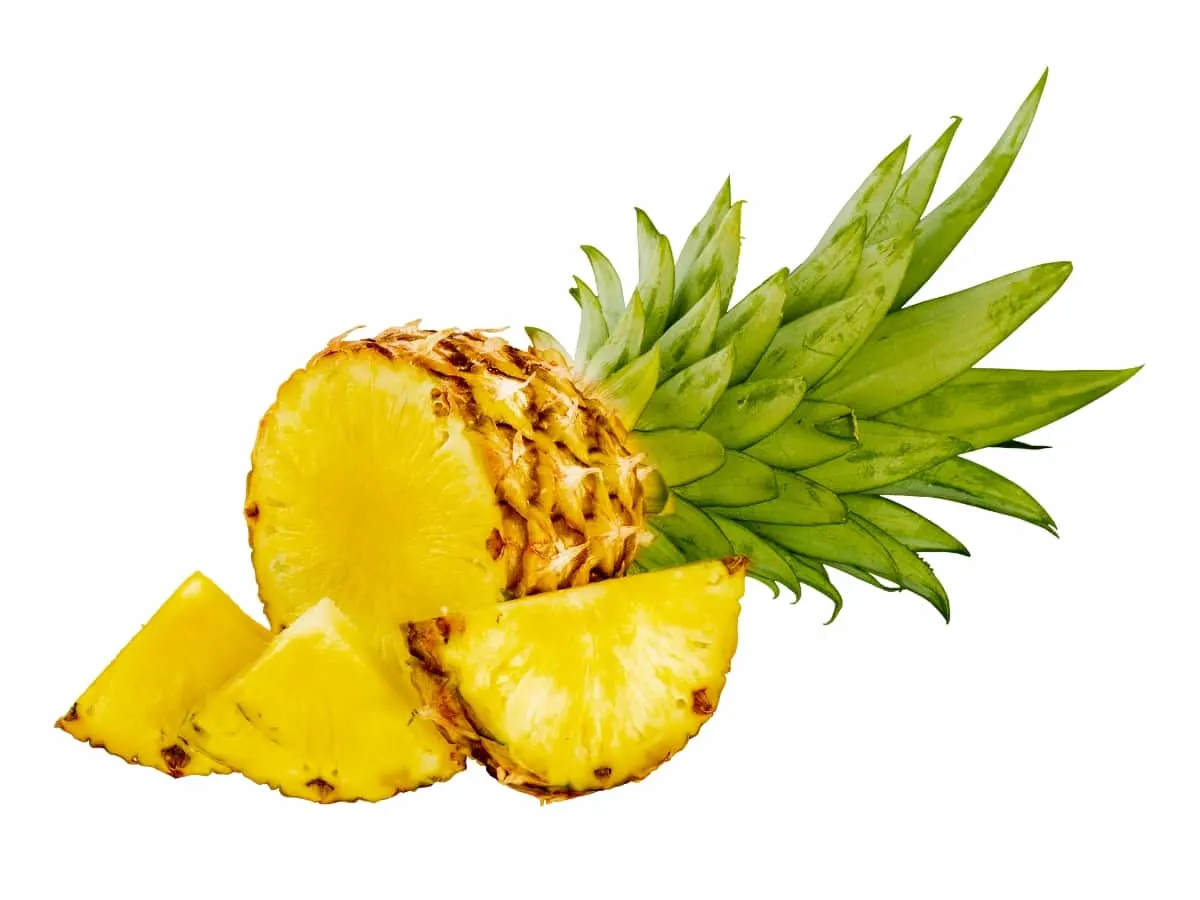
Labradors can eat pineapple in moderation. It is a healthy fruit that is high in nutrients, such as vitamin C, vitamin B6, and fiber, and low in calories. Nonetheless, pineapple contains high amounts of natural sugar, so it should be fed to Labradors in tiny amounts.
The vitamin C in pineapple boosts the immune system, works as an antioxidant, and helps protect against infections and diseases. It promotes good heart health as it is low in fat and cholesterol and contains potassium, which can lower blood pressure and reduce the risk of heart disease.
Pineapple also contains bromelain, a group of enzymes with anti-inflammatory and antimicrobial benefits
Here are some of the most important nutrients you can find in pineapple to benefit your Labrador:
- Vitamin C
- Vitamin A
- Fiber
- Potassium
- Bromelain
- Vitamin E
- Vitamin K
How to feed a Labrador pineapple:
When feeding pineapple to your Labrador, cut it into small bite-sized pieces or chunks, making sure to remove the hard outer skin and the tough inner core. Avoid canned pineapple as it may contain added sugars and preservatives.
My dog loves snacking on pineapple pieces, and I love giving them to her because they contain bromelain, which helps reduce inflammation in her body.
Plums
Labradors can eat plums. They are a great source of vitamins A, C, and K, fiber, and antioxidants. These nutrients support your Labrador’s immune system, promote healthy digestion, and defend against chronic diseases.
Plums contain high amounts of natural sugars, so you should only feed your Labrador 1-2 small pieces.
It may not be that your Labrador specifically likes plums, but rather that they are attracted to sweet and juicy fruits due to their natural instinct to look for high-energy foods.
Here are some of the most important nutrients you can find in plums to benefit your Labrador:
- Fiber
- Vitamin C
- Vitamin K
- Potassium
- Copper
- Vitamin B6
- Phytonutrients (such as flavonoids)
How to feed a Labrador plums:
The recommended way to feed plums to your Labrador is to remove the pit to prevent choking and cut the flesh into small pieces.
Raspberries
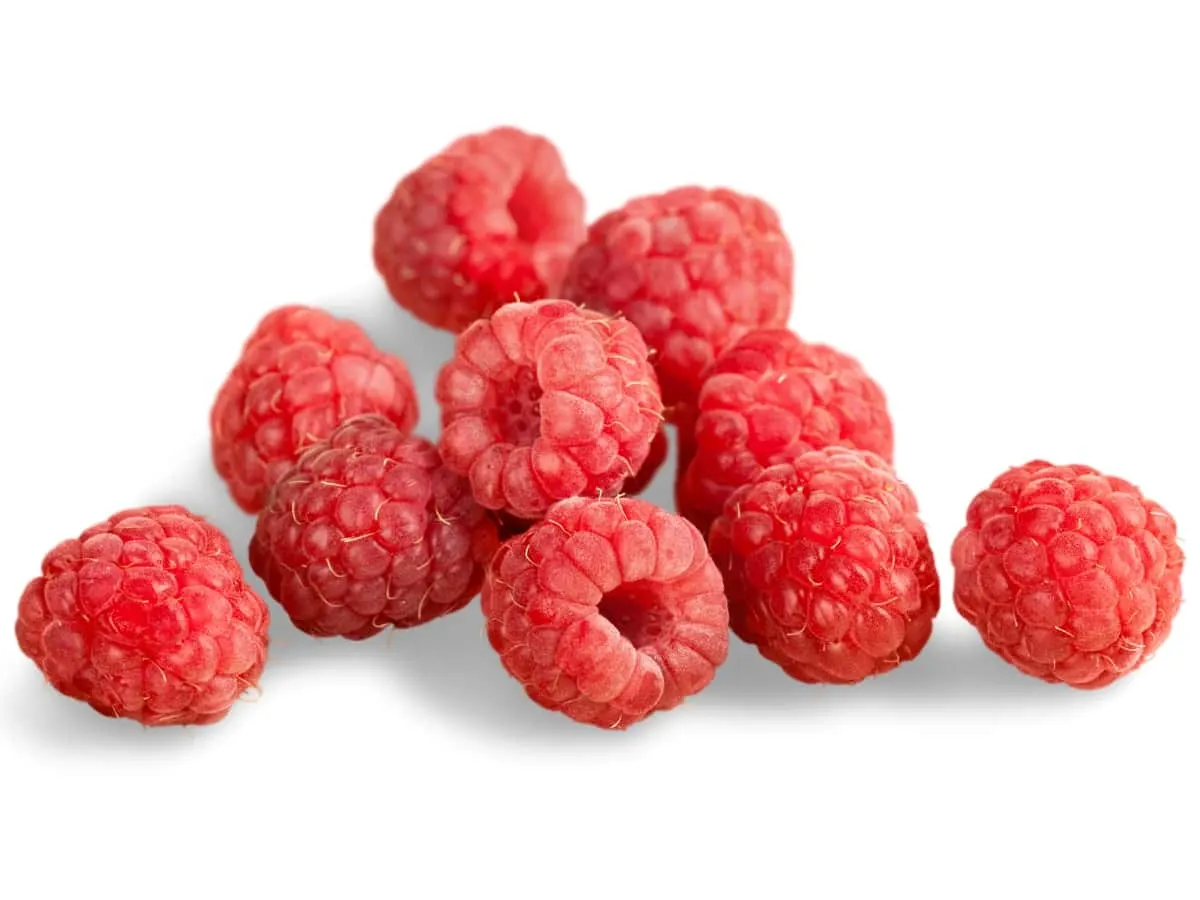
Labradors can eat raspberries. They are highly nutritious and offer a range of health benefits for dogs. They are rich in antioxidants, fiber, vitamins, and minerals, which all help to protect cells from damage, support healthy digestion, control blood sugar levels, and promote healthy bone development and wound healing.
Your Labrador will like raspberries because they are sweet, have a unique texture, and smell good. They make a great alternative to commercial treats, especially as they are not considered high in sugar compared to many other fruits.
Here are some of the most important nutrients you can find in raspberries to benefit your Labrador:
- Fiber
- Antioxidants
- Vitamin C
- Manganese
- Vitamin K
- Vitamin E
- Potassium
How to feed a Labrador raspberries:
To feed your Labrador raspberries, thoroughly wash them to remove dirt or debris. Remove the stems and leaves and cut them into small pieces to make them easier for your dog to eat. My dogs enjoy raspberries in hot weather, and they make a nice refreshing treat.
Strawberries
Labradors can eat strawberries. They are full of vitamins, minerals, and antioxidants, which can help to support excellent immune function, promote healthy digestion, and reduce the risk of chronic diseases such as cancer, heart disease, and diabetes. Strawberries are also a great source of fiber, which can help to regulate blood sugar levels and support healthy digestion.
Most Labradors will thoroughly enjoy the taste and texture of strawberries. Here are some of the most important nutrients you can find in strawberries to benefit your Labrador:
- Vitamin C
- Folate
- Potassium
- Fiber
- Manganese
- Antioxidants
- Vitamin K
How to feed a Labrador strawberries:
If you’re unsure how to feed strawberries to your Labrador, wash them thoroughly and remove the stems and leaves. Cut the strawberries into small pieces and feed them to your dog in moderation. I like to add some chopped strawberries to my dog’s meals. They are high in vitamin C and help boost her immune system.
Tangerines
Labradors can eat tangerines. However, while they are not toxic to Labradors, they are not recommended due to their high sugar and acidic content. Along with other citrus fruits, they can cause digestive issues such as upset stomach, vomiting, and diarrhea.
Although tangerines are a great source of vitamin C, which supports a healthy immune system, I’ve listed many other fruits on this list that are more beneficial and safer for your Labrador to eat.
If you do want to feed your Labrador tangerines, you must remove all seeds and the peel before feeding any to your dog. Ensure you feed very sparingly and monitor your Labrador for any signs of digestive issues.
Watermelon

Labradors can eat watermelon. It is a nutrient-dense fruit that offers many health benefits. Watermelon is full of vitamins A, B6, and C, as well as potassium and fiber. The high levels of antioxidants can prevent cellular damage and lower the risk of chronic diseases such as cancer and heart disease. The fruit’s high water content can also help keep your Labrador hydrated and promote healthy digestion.
Your Labrador may enjoy eating watermelon because it’s a sweet and refreshing fruit. The organic sugars in watermelon can also be attractive to dogs, and the juicy texture can be satisfying to chew on.
Here are some of the most important nutrients you can find in watermelon to benefit your Labrador:
- Vitamin A
- Vitamin B6
- Vitamin C
- Potassium
- Fiber
- Antioxidants
How to feed a Labrador watermelon:
Your Labrador can eat watermelon in small pieces. You need to remove the seeds and rind, then cut the fruit into small, bite-sized pieces. I’ve known some dogs who enjoy watermelon frozen or blended into a smoothie. Whenever I want to give my dog a treat, I reach for a slice of watermelon. It’s low in calories and high in hydration, which is great for her overall health.
How to Prepare Fruit for Your Dog
While fruits can be a healthy and delicious snack for Labradors, you must prepare them properly to ensure they are safe for your furry friend to eat.
Here are some tips on how to prepare fruit for your dog:
- Wash the fruit thoroughly: Rinse the fruit with water to remove any dirt, pesticides, or other contaminants.
- Remove any seeds or pits: Some fruits, like plums, peaches, mangoes, and apples, have seeds or pits that can be harmful to dogs if ingested. Make sure to remove these before giving the fruit to your Labrador.
- Cut the fruit into bite-sized pieces: Cut the fruit into small pieces that your Labrador can easily chew and swallow. This also helps prevent choking.
- Introduce new fruits gradually: If your Labrador hasn’t eaten a particular fruit before, introduce it gradually to avoid any digestive issues.
- Avoid giving your dog too much fruit: While fruits can be healthy, you should only provide them in moderation as many are high in sugar.
Serving Size and Frequency
The recommended amount of daily treats for dogs depends on their size, age, and activity level. Generally, it’s advised that treats make up no more than 10% of a dog’s daily caloric intake.
For example, a small Labrador weighing 5 pounds with normal activity levels may only need 250 calories per day, so their fruit treats should be limited to 25 calories.

Fruits That Labradors Can’t Eat
Now that you are fully aware of which fruits your Labrador can eat, you must also be aware of those that they cannot.
Labradors should not eat fruits such as grapes (and their dried variants, raisins) as they can cause kidney damage. Other toxic or dangerous fruits are avocados, cherries, grapefruit, lemons, limes, starfruit, and gooseberries.
Avocado
Avocado can be harmful to your Labrador due to the presence of a toxin called persin in its skin, leaves, bark, and pit. While the flesh of the fruit contains less persin, it is still dangerous for your dog to eat.
Keep your dog away from your avocado plants at home to prevent any potential harm. Additionally, the fruit’s seed may obstruct your pet’s stomach or intestines, which can prove fatal. Additionally, the high-fat content of this fruit can lead to pancreatitis, especially if your Labrador is sensitive.
If your dog consumes a lot of avocados, he may show poisoning symptoms like vomiting, diarrhea, and abdominal pain.
Cherries
It is not advised to feed cherries to Labradors. While the flesh of the fruit is not poisonous, the cherry pit, stem, and leaves contain cyanide, which can be toxic if ingested in large amounts.
Eating these parts of the cherry can lead to severe health issues, including an upset stomach, difficulty breathing, bright red gums, and shock.
Citrus Fruit (Lemon, Lime & Grapefruit)
Labradors should not eatbcitrus fruit like lemons, limes, and grapefruit. They aren’t easy on your Labrador’s stomach. Thankfully, most Labradors do not like citrus fruits due to their sour taste.
Lemons and limes, like other citrus fruits, comprise essential oils such as limonene and linalool, as well as a phototoxic compound called psoralens. While small amounts of these substances are unlikely to seriously threaten your Labrador, they can cause a severe gastrointestinal upset.
Gooseberries
Labrador owners should avoid giving their furry friends even small amounts of gooseberry, as they can be extremely harmful. If your Labrador were to eat them, they might experience symptoms similar to food poisoning.
Both the malic and citric acids found in gooseberries have been linked to gastrointestinal problems like diarrhea and stomach discomfort. They also contain glyoxylic acid, which is poisonous to dogs because it can produce oxalic acid, which can prevent calcium absorption in your dog’s body.
Grapes
Labradors should never eat grapes as they are known to be highly poisonous to dogs. Even small amounts of grapes or raisins can cause acute sudden kidney failure, which can be life-threatening.
Veterinarians remain wary when treating grape toxicity in dogs, and the source of the toxicity still remains a mystery.
The toxicity seems to be in the grape’s flesh, whether or not the grapes are seedless, peeled, dried, or fresh. Grape or raisin toxicity symptoms in Labradors include vomiting, diarrhea, lethargy, abdominal pain, and decreased urination. If you are worried that your Labrador has eaten grapes or raisins, you should contact your veterinarian immediately.
Star Fruit
Star Fruit is off-limits to Labradors. It has a substance called caramboxin that can make dogs experience neurological symptoms like seizures, tremors, and vomiting. Kidney failure could also occur and be fatal. Labradors should never consume any star fruit, no matter how little.
Let’s Wrap This Up!
You can feed your Labrador several safe fruits as a healthy treat. Always remove any seeds or pits and cut the fruit into small pieces to prevent choking. By incorporating these fruits into your Labrador’s diet, you can provide them with essential vitamins and nutrients while also satisfying their sweet tooth.
Happy feeding!
Related Posts:

